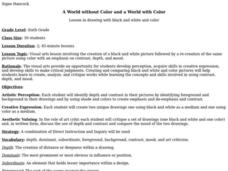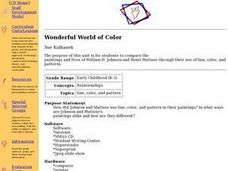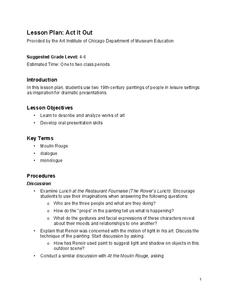Curated OER
A World Without Color And A World With Color
Sixth graders create black and white pictures followed by a re-creation of the same picture using color with an emphasis on contrast, depth, and mood.
Curated OER
Wonderful World of Color
Students compare the paintings and lives of William H. Johnson and Henri Matisse through their use of line, color, and patterns to publish an individual fact book. They then create an imaginary painting while listening to classical music.
Curated OER
Praise for a Color
Students discover the 5 senses by analyzing poetry. In this poetry instructional activity, students read a poem with their class and analyze how each sense plays into their understanding of the poem. Students write a poem...
Curated OER
Lesson 1- Set Design
Line, shape, color, texture, space. The first in a three-part series of lessons intended for advanced theatre arts classes introduces the elements of set design. Class members examine maquettes and analyze how designers have put together...
Teaching Tolerance
Using Photographs to Teach Social Justice | Exposing Gender Bias
Young sociologists are asked to read two photographs, identifying how the photographer uses point of view, color, pose, light, and shadow to express a stereotype of women or to challenge those stereotypes. Partners then create their own...
Debra J. Herman
The Blue Room by Susanne Valadon
Nearly anything can inspire art. Analyze The Blue Room by Susanne Valadon to help your learners understand that art is everywhere. They'll discuss the line, shape, color, and mood of the piece while attempting to better grasp its...
Core Knowledge Foundation
Unit 2: The Tempest by William Shakespeare Teacher Guide
Massive storms, shipwrecks, survivors stranded on an island ruled by an aging magician, and strange creatures—Shakespeare's The Tempest appeals to today's middle schoolers. For this unit, seventh graders read selections from an...
National Endowment for the Humanities
Lesson 1: In Depth with the Full Spectrum
High schoolers study the ways in which an artist can use color. They view various images of artwork and discuss the effect of color on spacial dimensions, focal points, tone, and mood.
Curated OER
Explore the Elements of Art
Students recognize elements of art such as texture, shape line and color. In this elements of art lesson, students create a still life picture with oil pastel or crayons. Students define elements of art vocabulary....
Curated OER
Understanding Stage Design: Using Visual Elements to Provide Information to an Audience
Students study about theatrical design by developing environments for improvised and scripted scenes. They develop focused ideas for an environment using visual elements.
Curated OER
Perceiving Place
Learners observe how color creates the mood of a place, and generate sketches and drawings that capture their observations.
Curated OER
A Poem About Sadness
In this emotional health worksheet, students explore the feelings of sadness, grief and loss by first reading and decorating a poem which states that it is all right to feel sad. Students color emotion pictures and discuss as a group why...
Curated OER
Book Nook
A reading of Dr. Seuss's My Many Colored Days provides a great intro for a discussion of colors and how they can represent emotions and moods. Kids share the feelings they associate with various colors
Curated OER
Raindrops Keep Falling on my Art
Kids may be a little resistant to this rainy day idea, but it could produce some amazing art. They paint a watercolor picture of anything they like. When they are done, they take their paintings outside and let the rain work its magic!...
Curated OER
Literary Terms
Seriously, 93 slides of literary terms? Yes, and well worth the time, although perhaps not all at once. The beauty here is in the concise, easy-to-understand definitions for such well-known terms as imagery and personification, as well...
Art Institute of Chicago
Act It Out
Examine two works of art and use these pieces as inspiration for dialogues. The whole class discusses Renoir's Lunch at the Restaurant Fournaise and Toulouse-Lautrec's At the Moulin Rouge. Then, in groups of either three or ten, pupils...
Curated OER
A Study of Warm And Cool Colors
Second graders create a multimedia painting using warm or cool colors expressively. They demonstrate multimedia techniques in a drawing using pencil, oil pastel and tempera paints. They recognize and discuss mood created by warm and cool...
Curated OER
Lesson: Elizabeth Peyton: The Self in the Other's Image: Portraiture and Identity
Art, identity, and an imaginary community, three components that should make for an interesting lesson. Critical thinkers explore and evaluate the work of contemporary artist, Elizabeth Peyton. They discuss her use of subject and art to...
Curated OER
Power of Color on Emotion
Fifth graders utilize resources to select, analyze, and journal about a particular artist's expression of mood and feelings. They produce paintings that demonstrate the use of color mixing and schemes that show a variety of emotions.
Curated OER
Color
Students learn the effect that warm and cool colors have for those who see them used in visual art. They create a collage of variety of colors. They participate in a gallery walk to view the artwork of others.
Curated OER
Self-Portraits
Sixth graders create self-portraits. In this visual arts lesson, 6th graders examine the relationship between mood and color value in pieces of art. Students create self-portraits that convey mood using cut paper and glue.
Curated OER
How Do you Feel?
Young scholars discover how moods and perceptions can be affected by colors. As a class, they create their own color wheel and identify primary and secondary colors. They draw their own cool and warm color mosaic and discuss how each one...
Curated OER
Vegetable Print Patterns
Create a unique print using vegetable stencils and tempera paints applied to grid like pattern formed from cut pieces of paper. Your students will choose either a warm or a cool color scheme.
Curated OER
Mood and Tone
Students describe their current mood in several complete sentences. They compare their moods with moods set by authors through the tone of their writing. Students read a teacher prepared handout about mood/tone of writing. They write...























